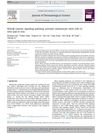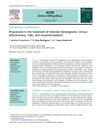 211 citations,
April 2018 in “Cold Spring Harbor Perspectives in Biology”
211 citations,
April 2018 in “Cold Spring Harbor Perspectives in Biology” Keratins are crucial for cell structure, growth, and disease risk.
[object Object]  185 citations,
February 2018 in “Journal of Investigative Dermatology”
185 citations,
February 2018 in “Journal of Investigative Dermatology” Melatonin may benefit skin health and could be a promising treatment in dermatology.
 108 citations,
November 1980 in “British Journal of Dermatology”
108 citations,
November 1980 in “British Journal of Dermatology” Oral retinoids are effective for various skin conditions but have side effects and should not be used during pregnancy.
 52 citations,
June 1981 in “International Journal of Dermatology”
52 citations,
June 1981 in “International Journal of Dermatology” Oral retinoids are effective for severe skin conditions but require careful use due to side effects.
 45 citations,
April 2016 in “Journal of Dermatological Science”
45 citations,
April 2016 in “Journal of Dermatological Science” The Wnt/β-catenin pathway can activate melanocyte stem cells and may help regenerate hair follicles.
 41 citations,
November 2003 in “Annals of the New York Academy of Sciences”
41 citations,
November 2003 in “Annals of the New York Academy of Sciences” Male hormones, or androgens, affect women's health in areas like mood and bone density, and hormone replacement therapy using antiandrogenic progestogens can improve mood disorders and alertness in menopausal women.
 31 citations,
February 2014 in “Inflammation Research”
31 citations,
February 2014 in “Inflammation Research” Lower CD200R1 on certain immune cells is linked to more severe rheumatoid arthritis and immune imbalance.
 28 citations,
July 2017 in “Journal of Endocrinological Investigation”
28 citations,
July 2017 in “Journal of Endocrinological Investigation” Early onset baldness in men may indicate a condition similar to PCOS, linked to heart disease, diabetes, and prostate issues.
 26 citations,
March 2014 in “Journal of cutaneous medicine and surgery”
26 citations,
March 2014 in “Journal of cutaneous medicine and surgery” Topical vitamin D is useful for some skin conditions but not effective for others, and more research is needed.
 18 citations,
December 1996 in “Seminars in Cutaneous Medicine and Surgery”
18 citations,
December 1996 in “Seminars in Cutaneous Medicine and Surgery” Chemotherapy and cytokine therapy can cause various skin reactions, including hair loss and hypersensitivity.
 16 citations,
December 2011 in “Actas Dermo-Sifiliográficas”
16 citations,
December 2011 in “Actas Dermo-Sifiliográficas” Propranolol is effective and safe for treating infantile hemangioma, but more research is needed for dosing and monitoring guidelines.
 16 citations,
August 1967 in “JAMA”
16 citations,
August 1967 in “JAMA” Oral contraceptives may cause hair loss in women.
 15 citations,
August 2021 in “Reviews in endocrine and metabolic disorders”
15 citations,
August 2021 in “Reviews in endocrine and metabolic disorders” COVID-19 and hypopituitarism (reduced pituitary gland function) are linked, with the latter's related health issues potentially worsening COVID-19 outcomes, and COVID-19 possibly increasing risk for pituitary complications.
 15 citations,
January 1988 in “Drugs”
15 citations,
January 1988 in “Drugs” The document concludes that treatments for female hair loss and excessive hair growth are temporary and not well-studied.
 14 citations,
January 1985 in “International Journal of Dermatology”
14 citations,
January 1985 in “International Journal of Dermatology” The cause of alopecia areata was unknown, and while various treatments existed, no best treatment was agreed upon.
 12 citations,
November 2003 in “Journal of the American Academy of Dermatology”
12 citations,
November 2003 in “Journal of the American Academy of Dermatology” Topical diphencyprone helped regrow hair in mice and rats with a condition similar to human hair loss.
 2 citations,
September 2023 in “Curēus”
2 citations,
September 2023 in “Curēus” Topical spironolactone may help treat ocular graft-versus-host disease with minimal side effects.
 1 citations,
December 2022 in “Türk tarım - gıda bilim ve teknoloji dergisi”
1 citations,
December 2022 in “Türk tarım - gıda bilim ve teknoloji dergisi” Diversifying tea products can boost profits and meet global market demands.
 December 2023 in “Majalah Kedokteran Gigi Indonesia”
December 2023 in “Majalah Kedokteran Gigi Indonesia” Cinnamaldehyde helps bone healing initially but may slow healing later unless combined with DHT treatment.
 November 2023 in “Deleted Journal”
November 2023 in “Deleted Journal” Cedrus libani has potential medicinal uses but needs more safety studies.
[object Object]  August 2023 in “International journal of research in Ayurveda and pharmacy”
August 2023 in “International journal of research in Ayurveda and pharmacy” Garudan Kizhangu Ennai may effectively treat alopecia areata but needs more research to confirm its safety and effectiveness.
 February 2023 in “Journal of clinical medicine research”
February 2023 in “Journal of clinical medicine research” Zinc acetate hydrate may help reduce fatigue and hair loss in post-COVID-19 patients.
 January 2023 in “Discovery immunology”
January 2023 in “Discovery immunology” T cells and bacteria in the gut and skin help maintain health and protect against disease.
 June 2022 in “Biomedical reports”
June 2022 in “Biomedical reports” STK11 gene variations do not predict how well metformin will work for PCOS, but may affect hair loss and excess hair growth.
 March 2014 in “Human Physiology”
March 2014 in “Human Physiology” DHEA improved brain function and behavior in old monkeys and had additional health benefits.
 May 2010 in “Current Women's Health Reviews”
May 2010 in “Current Women's Health Reviews” The document concludes that early diagnosis and treatment of PCOS in teenagers is important for managing symptoms and preventing long-term health problems.
 January 2008 in “Springer eBooks”
January 2008 in “Springer eBooks” Thyroid disease can cause hair loss and treating thyroid problems might help with hair disorders.
 2 citations,
January 2023 in “Redox Report”
2 citations,
January 2023 in “Redox Report” Estradiol may protect ear cells from hearing loss caused by a chemotherapy drug by activating a protective pathway.
 March 2024 in “Dermatology and therapy (Internet)”
March 2024 in “Dermatology and therapy (Internet)” Genetic factors could lead to personalized treatments for hair loss.
 10 citations,
May 2021 in “Stem Cell Research & Therapy”
10 citations,
May 2021 in “Stem Cell Research & Therapy” Bone marrow-derived stem cells improved healing and reduced scarring in second-degree burns in rats.






























